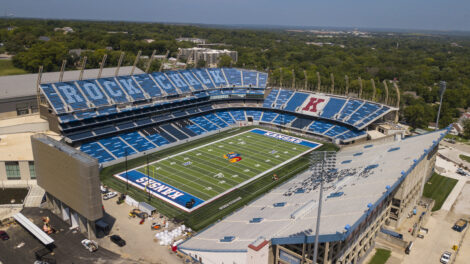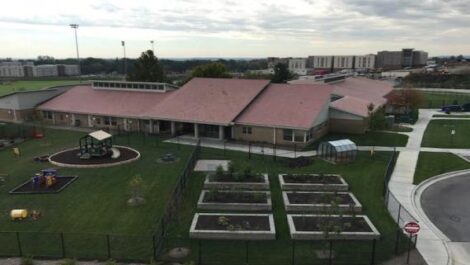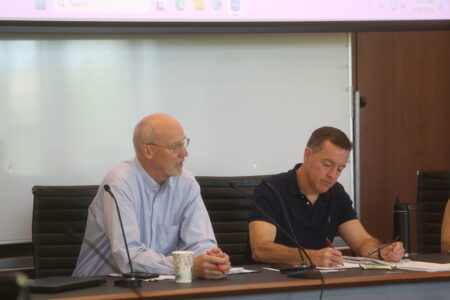KU developing ideas for increased connectivity between renovated stadium, downtown Lawrence

photo by: Shawn Valverde/Special to the Journal-World
David Booth Kansas Memorial Stadium is pictured on Tuesday, April 15, 2025.
Downtown Lawrence Inc. supports the University of Kansas’ ongoing Gateway Project, but as the organization’s executive director Andrew Holt said on Wednesday, “We feel that it will really be positive in the truest sense if there is an enhanced corridor between KU, the Gateway Project and downtown.”
As KU takes steps toward establishing such a corridor — with an eye toward the stadium’s official opening on Aug. 23, for the Jayhawks’ football season opener against Fresno State — deputy athletic director Jason Booker addressed the members of Downtown Lawrence Inc. at its annual breakfast meeting on Wednesday morning at Maceli’s Banquet Hall.
Booker shared a variety of ideas geared toward increasing connectivity between KU football and downtown businesses, largely under the umbrella of building new traditions attached to a new iteration of David Booth Kansas Memorial Stadium.
It’s a welcome return to the city for the KU football team after a season spent hosting games out of town at Children’s Mercy Park in Kansas City, Kansas, and GEHA Field at Arrowhead Stadium in Kansas City, Missouri, something Booker acknowledged may have caused “angst and a little bit of strain” for downtown Lawrence.
“We appreciate the patience,” he said. “We know that the back side of this is going to be so much better for everybody over the next 10 to 15 years, so short-term pain for long-term gain was kind of our philosophy last year.”
A key part of that long-term gain is predicated on heightening KU’s game-week experience to match the overall growing momentum of the football program. To that end, the athletic department is keen on tying its game-day programming more closely to downtown Lawrence.
For example, Booker said KU wants to send its band, cheer squad, mascots and athletes from other sports into downtown to raise awareness on Friday nights; bring buskers and balloon artists to game days; and establish a series of downtown concerts to pair with Saturday’s game action, which KU would promote during games and on social media.
“Could we do something outside the Granada one Saturday, and then move it down to the other end maybe outside of Jefferson’s the next weekend, doing kind of a local concert series after every game,” he said, “so that people know, ‘Hey, I know something’s going on downtown, I’m not sure exactly what it is, but I know my plans are (that) after the game, we’re always going to find our way down there.'”
One of the broadest concepts Booker presented on Wednesday was an idea to light up Lawrence blue on Fridays, taking advantage of the massive lights that are one of the most prominent features of the revamped stadium, but also integrating the promotion with the holiday lights that can be found downtown.
“We were in Providence for the basketball tournament,” Booker recalled, “and their downtown, their entire corridor is lit up blue, and I took this picture and I’m like, ‘That’s kind of what we’re looking for.'”
He said the goal would be to spread the blue lighting to homeowners, local businesses and KU’s campus as well.
“These are some new traditions that will take time to probably implement,” he said, “but some things that we want to start to get out there and to help promote.”
Booker also spent some of his presentation discussing increased transportation integration between the stadium and downtown. He recalled a visit to Manhattan for last year’s Kansas State game at which he had to park 16 or 18 blocks away from the stadium, during which time he became acutely aware that Massachusetts Street is just six blocks from David Booth Kansas Memorial Stadium.
He suggested that KU could provide shuttle service from parking garages on New Hampshire and Vermont streets, establish a clear ride-share drop-off system near the stadium, and also shut down 11th Street between Maine and Illinois streets to create a better pedestrian environment.
Base camp update
Booker has also been at the forefront of an effort to earn Lawrence a spot as a base camp for an international soccer team to live and train at Rock Chalk Park during the 2026 FIFA World Cup.
He said on Wednesday, “I like our odds,” stating it was his understanding that 55 cities remained in contention for 48 teams, with further clarity to come next winter.
Booker said that as countries have come to Lawrence to explore KU’s facilities, several key advantages of the city have come to the forefront. For one, he said teams are allowed to stay in their initial group-stage base camps into the knockout stages if they are within a three-hour flight of their new destination. Lawrence, of course, is centrally located for a World Cup that takes place between the United States and Mexico.
In addition, the KU campus helps provide resources to teams that might not be present elsewhere, he said.
“They love the university community and the assets that a college could bring for a base camp,” Booker said, “meaning all the things that we do to help support our teams: laundry services, weight facilities, all those things you can think about.”
Phase II update
The new David Booth Kansas Memorial Stadium, still under construction, will soon host commencement festivities, and then in the fall seven home games for the KU football team. But it is still, as athletic director Travis Goff has said, just about 70% of a new stadium. The east end of the venue will remain in its previous form until the second phase of construction gets underway.
The Journal-World reported in December, upon KU’s formal announcement of its plans for the second phase — which will include a Marriott hotel, student housing and entertainment plaza, and bring the overall cost of the stadium project to about $759 million — that university leaders hoped to begin construction on the second phase in late 2025, depending on the approval of certain public financing measures.
Booker reiterated to the Journal-World on Wednesday that starting at the end of the year, following the season, “would still be the goal, for sure.”
“We’re focused on trying to make that happen,” he said, “but we have to have some things happen between now and then, from some of the incentives … to get there.”
Indeed, he told the Downtown Lawrence Inc. members that a lot needs to get worked out with regard to those tax incentives and STAR bonds before, for example, KU can hone in on specifics about which retail partners might be involved in Phase II.
“Until we get to a point where we feel like the project can and will move forward for Phase II, it’s hard to start to have those real discussions on who and what and when until we know that, ‘Hey, this thing’s actually going to go,'” he said. “So I think that there’s probably some critical moments coming up in the next several months that we will have to make some of those decisions.”
He said that when Phase II eventually gets underway, KU will continue to play in David Booth Kansas Memorial Stadium during construction, and “our hope would be that we would have our whole seating capacity” available during that period.







